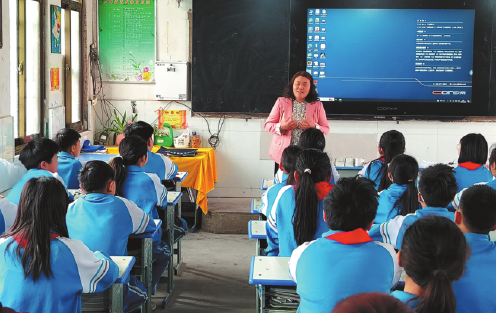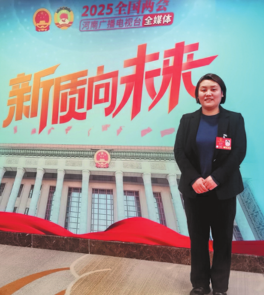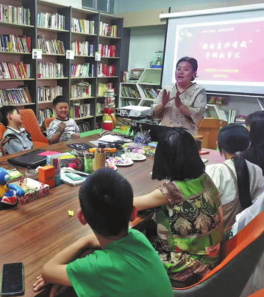Turning a new page for village readers
Library shows how a dream can transform a community, Wang Ru and Shi Baoyin report.

Li Cuili was regarded as kind of a "weirdo" when she decided to open a library at her convenience store providing books for villagers to read for free in 2008.
While others were busy making a living, Li, a farmer who later opened a store in Lishi village, Neihuang county, Anyang, Henan province, thought bigger and wanted to improve the cultural atmosphere in the village through the power of books.
That wish initially came from a mother's love for her child. That year, she watched a performance at her village with her son. To her surprise, the show was vulgar and unsuitable for children.
Feeling anxious that children would grow up and be exposed to such an environment, she wanted to change the situation and began to offer books for villagers, because, she believes, "books are mostly beneficial".
From feeling doubtful to offering support, villagers have seen Li's Weiguang Library grow from a small space that managed to survive with only 200 books to a village cultural activity center, with a collection of 5,000-6,000 books. Through her efforts, she saw reading gradually taking shape at her hometown. Now 45 years old, she has also been elected as a deputy to the 14th National People's Congress and president of Lishi village's women's federation.
The library's name Weiguang means "dim light".
"I named it Weiguang because it is only about putting several books on the shelves of a village store. It was initially a modest endeavor. Yet, no matter how faint the light, it has the power to keep the fire burning," says Li.
At the very beginning, due to the lack of a reading or literary culture, no villager came forward to borrow her books, although she offered them for free. Li decided to attract children first. She offered sugar to children who came to read, borrow books and write book reviews. In this way, more and more children were attracted to the library.
Their parents were surprised to discover children behaved much better than before, as they stopped rushing to play on the streets after school but went to Li's library to read. Then villagers began to speak highly of Li's efforts and offer support, and many of them began to borrow books as well and worked as volunteers at the library in their free time.
With the growing popularity, Li encountered new but pleasant problems as she could not get enough books to meet demand.
"Besides my books, all those I could get from relatives and friends were put in the library. But since people borrowed books for free, many of them didn't return them. Some damaged books also needed to be removed from circulation. Therefore, the number of books declined significantly," says Li.
As a result, she had to get more. Other than the necessary family expenses, she spent all her money buying books, but they were not enough. Since she could not afford so many new books, she tried every means to get more, like buying from secondhand stores and waste stations in the county and asking people to donate books online.
For a while, she rode a trishaw in the county, with introductions to her library on it, as a way of publicity to rent or get more books. Some people pointed at her and made snide remarks.
"There's the weirdo coming", or words in that vein were often uttered within earshot.
One winter some years ago, she rode the trishaw to a county institute to collect books that had been promised to her. She left home at 5 am and rode for 40 minutes braving the cold because she was happy to get more books. But when she arrived, she was informed by staff that the books had been considered worthless and sold to a waste station.
Walking out of the door of the institute, she was greeted by the rising sun. She faced the sun and cried out of tiredness and frustration.
Besides the difficulties caused by her expenditure, she felt a creeping doubt as to whether what she was doing was worthwhile.
But her readers encouraged her.
Li was impressed by a girl named Liu Caijin. About a decade ago, the girl often came to her library to read. A primary school student, she was too short to reach the bookshelves, so she'd move wooden stools to reach up.
One day, Li asked her what she wanted to become in the future. To her surprise, Liu said, "I also want to open a store which has a library, providing books for people to read for free."
"Now she is at a university, and I know she will not open a store. But I'm still moved when I remember her words. As the saying goes, it takes 10 years to grow a tree yet 100 years to bring up a person. Cultivating people is never something that can be done in a short time. I have often questioned if my library is meaningful, because it's so small. But at that moment, her words of affirmation consolidated my resolution to persist," says Li.
Many children who read books at the library have now grown up and as adults they support Li in their own ways. For example, some of them donate books to Li, some work as volunteers and others hold activities in the library.
With the growing popularity of her library, more support from society was offered to her work. With donations from nonprofit organizations, the library was renovated several times, tackling problems like water leakage. Book donations have continued to pour in.
"Now the pressure to run the library does not feel so heavy. Weiguang Library can continue to play a role today because many people have poured their love into it," says Li.
She has also worked to build the library into a cultural activity center, encouraging villagers to give lectures and participate in manual courses and scientific experiments. This has turned the library into an additional classroom for the villagers.
"I was impressed by Peking University Professor Wang Zizhou's words — 'a school in a library can be much more important than a library in a school'. I hope people not only read books, but also 'read' films, music and even a broader world here," says Li.
Jin Yan, a 24-year-old animal husbandry professional, says Li's library has been an indispensable part of her life as she grew up. She often went to the library to read when in primary school, borrowed books regularly when she was a middle school student and worked as a volunteer helping to organize activities when she attended vocational high school.
"I was very introverted in childhood, but through organizing and participating in activities at the Weiguang Library, I opened up to people more. That changed my character," she says.
Now, working as an NPC deputy, Li pays a lot of attention to nationwide reading, which encourages more such activity among the public across the country from this year's Government Work Report. Li says villagers reading books is an important part of realizing the goal.
"Villages often lag behind cities in development. Therefore, we need to accelerate efforts in encouraging reading. The country's nationwide reading initiative not only advocates more reading, but also leads to appreciating films, dramas, and understanding daily events and even people," says Li.
"For example, it's almost impossible to persuade senior villagers to read books, since many of them have difficulty reading. But the old people themselves are just like books, who can share their stories with younger people, making young people feel like reading books. In the process, the old people are also reading their own books," says Li.
Li believes cultural construction is an important part of rural vitalization, since lack of education and ignorance is behind many problems in villages. Therefore, she suggests more guidance and supervision on rural cultural markets and more social forces participating in shaping rural culture.
"It must be a long-term goal, requiring continuous efforts infusing cultural vitality into villages. I'm optimistic about its future," says Li.




Today's Top News
- Stable, healthy Sino-US business ties beneficial to all
- Fifth volume of 'Xi Jinping: The Governance of China' published
- Nanjing film aims to counter amnesia
- China and US agree to push for extension of tariff pause after Stockholm negotiations
- US, China trade talks candid, in-depth, constructive, says China intl trade representative
- China unveils delegation for Chengdu World Games






























